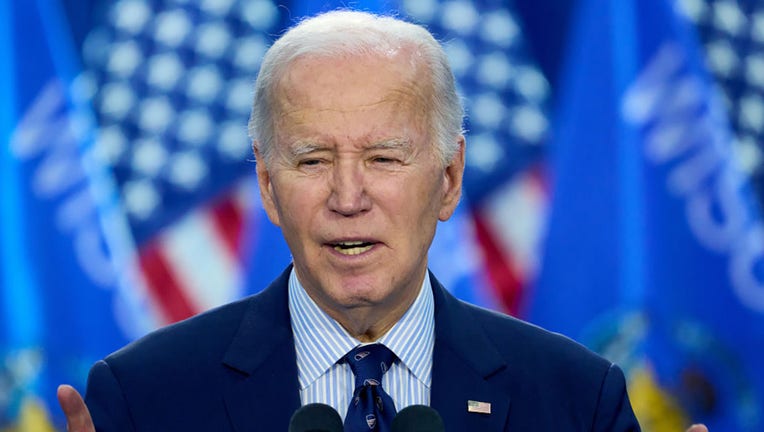Student loans canceled for another 160K borrowers, Biden administration says

FILE - US President Joe Biden speaks during an event in Madison, Wisconsin, on April 8, 2024. Photographer: Daniel Steinle/Bloomberg via Getty Images
WASHINGTON - Another 160,000 borrowers are getting their student loans canceled through a combination of existing programs, the Biden administration announced on Wednesday.
The latest round of cancellation will erase a total of $7.7 billion in federal student loans, Education Department officials said. To date, the administration has canceled $167 billion in student loan debt for nearly 5 million Americans through a variety of programs.
"From day one of my administration, I promised to fight to ensure higher education is a ticket to the middle class, not a barrier to opportunity," President Joe Biden said in a statement. "I will never stop working to cancel student debt — no matter how many times Republican-elected officials try to stop us."
Here’s what to know about the latest round of student loan relief:
Student loan forgiveness: Here’s who is eligible for latest round
The latest relief will go to borrowers in three categories who hit certain milestones that make them eligible for cancellation, officials said.
It will go to 54,000 borrowers who are enrolled in Biden's new income-driven repayment plan, along with 39,000 enrolled in earlier income-driven plans.
Additionally, it will go to about 67,000 who are eligible through the Public Service Loan Forgiveness program – which is open to teachers, librarians, nurses, public interest lawyers, military members and other public workers.
Biden’s SAVE plan
Biden's new payment plan, known as the SAVE Plan, offers a faster path to forgiveness than earlier versions.
The plan, which is short for "Saving on A Valuable Education," launched in August and replaced a previous IDR plan called Revised Pay As You Earn (REPAYE).
More people are now becoming eligible for loan cancellation as they hit 10 years of payments, a new finish line that's a decade sooner than what borrowers faced in the past.
The cancellation is moving forward even as Biden's SAVE Plan faces legal challenges from Republican-led states. A group of 11 states led by Kansas sued to block the plan in March, followed by seven more led by Missouri in April. In two federal lawsuits, the states say Biden needed to go through Congress for his overhaul of federal repayment plans.
1 in 10 borrowers now approved for some form of relief
A separate action by the Biden administration aimed to correct previous mistakes that delayed cancellation for some borrowers enrolled in other repayment plans and through Public Service Loan Forgiveness, which forgives loans for people who make 10 years of payments while working in public service jobs.
The Biden administration has been announcing new batches of forgiveness each month as more people qualify under those three categories. According to the Education Department, 1 in 10 federal student loan borrowers has now been approved for some form of loan relief.
"One out of every 10 federal student loan borrowers approved for debt relief means one out of every 10 borrowers now has financial breathing room and a burden lifted," Education Secretary Miguel Cardona said in a statement.
Biden’s latest one-time cancellation proposal after SCOTUS ruling

Biden reveals $1.2B student loan forgiveness plan
The American Institute for Economic Research's William Luther Aier joins LiveNOW's Andrew Craft to discuss President Biden's new $1.2 billion student loan forgiveness plan.
The Biden administration has continued canceling loans through existing avenues while it also pushes for a new, one-time cancellation that would provide relief to more than 30 million borrowers in five categories – a proposal separate to the SAVE payment plan.
The Supreme Court rejected Biden's earlier attempt at one-time cancellation, saying it overstepped the president's authority. The new plan is being made with a different legal justification.
Biden's new plan aims to help borrowers with large sums of unpaid interest, those with older loans, those who attended low-value college programs, and those who face other hardships preventing them from repaying student loans.
It would also cancel loans for people who are eligible through other programs but haven't applied.
The proposal is going through a lengthy rulemaking process, but the administration said it will accelerate certain provisions, with plans to start waiving unpaid interest for millions of borrowers starting this fall.
Conservative opponents have threatened to challenge that plan too, calling it an unfair bonus for wealthy college graduates at the expense of taxpayers who didn't attend college or have already repaid their loans.
This story was reported from Cincinnati. The Associated Press contributed.

